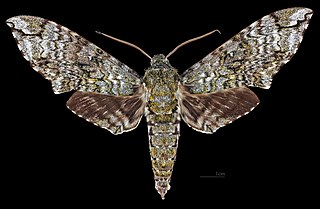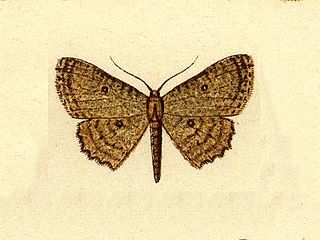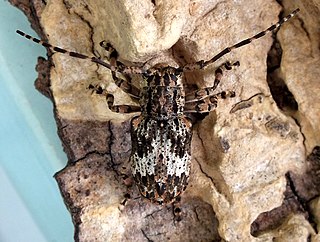
Manduca is a genus of moths in the family Sphingidae, the hawkmoths. The genus is used as a model in the biological sciences. The tobacco hornworm and the tomato hornworm in particular have been well studied. The genus was erected by Jacob Hübner in 1807.

Manduca lichenea is a moth of the family Sphingidae first described by Hermann Burmeister in 1855.

Cyclophora lichenea is a moth of the family Geometridae. It is found on Jamaica.

Mesosini is a tribe of longhorn beetles of the subfamily Lamiinae.

Coptops is a genus of longhorn beetles of the subfamily Lamiinae, containing the following species:
Parapsestis lichenea is a moth in the family Drepanidae. It was described by George Hampson in 1893. It is found in Sikkim in India, Myanmar, Thailand, Vietnam and the Chinese provinces of Henan, Shaanxi, Zhejiang, Hubei, Fujian, Sichuan, Yunnan and Tibet.
Coptops ocellifera is a species of beetle in the family Cerambycidae. It was described by Stephan von Breuning in 1964. It is known from China and Laos.
Coptops thibetana is a species of beetle in the family Cerambycidae. It was described by Stephan von Breuning in 1974, originally as C. thibetanus.
Coptops variegata is a species of beetle in the family Cerambycidae. It was described by Stephan von Breuning in 1938.
Coptops illicita is a species of beetle in the family Cerambycidae. It was described by Francis Polkinghorne Pascoe in 1865. It is known from Indonesia and the Philippines.
Coptops undulata is a species of beetle in the family Cerambycidae. It was described by Francis Polkinghorne Pascoe in 1865. It is known from Malaysia and Java.

Coptops aedificator, the Albizia long-horned beetle, is a species of beetle in the family Cerambycidae. It was described by Johan Christian Fabricius in 1792, originally under the genus Lamia. It is known from Djibouti, Tanzania, the Democratic Republic of the Congo, Ethiopia, Oman, Gabon, India, Madagascar, Malawi, Namibia, Nigeria, Saudi Arabia, the Ivory Coast, Cameroon, Senegal, South Africa, Seychelles, Mauritius, Sri Lanka, and Zambia. It was also introduced into Cape Verde, Hawaii, and Taiwan. It feeds on Theobroma cacao and several Coffea species, including C. arabica, C. canephora, and C. liberica var. dewevrei.
Coptops alboirrorata is a species of beetle in the family Cerambycidae. It was described by Ernst Fuchs in 1966. It is known from Vietnam.
Coptops annobonae is a species of beetle in the family Cerambycidae. It was described by Aurivillius in 1910. It occurs on the island of Annobón, Equatorial Guinea.

Coptops annulipes is a species of beetle in the family Cerambycidae. It was described by Charles Joseph Gahan in 1864. It is known from Malaysia, Cambodia, Indonesia, China, Laos, Myanmar, Thailand, India, and Vietnam.
Coptops humerosa is a species of beetle in the family Cerambycidae. It was described by Fairmaire in 1871, originally as C. humerosus. It is known from Seychelles.

Coptops leucostictica is a species of beetle in the family Cerambycidae. It was described by White in 1858. It is known from India, Cambodia, Thailand, Laos, China, Myanmar, Malaysia, and Vietnam. It feeds on Albizia julibrissin.
Coptops rufa is a species of beetle in the family Cerambycidae. It was described by James Thomson in 1878. It is known from the Andaman and Nicobar Islands.

Coptops tetrica is a species of beetle in the family Cerambycidae. It was described by Newman in 1842, originally under the genus Agelasta. It is known from the Philippines.







